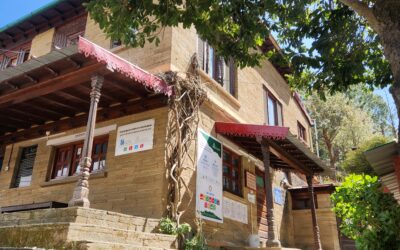*content warning*: violence, self-harm, suici/al ideation
“Know all the theories, master all the techniques, but as you touch a human soul, be just another human soul.” – Carl G. Jung
Shankar Poonaji, around 40-45 years old, was sitting on the steps of a closed marble shop near Siphon Chauraha (where four roads meet) with his friend Bhagat Singh. They were tolerating the scorching heat alongside other labourers as Udaipur, the city of lakes in Rajasthan, was struggling to return to normalcy after recent communal tension over an incidence of violence.
Shankar’s nickname is Kaalu, meaning “dark-skinned” or “black”, not given by his parents but by those around him due to his dark complexion. India’s obsession with fair skin is well-known and deep-rooted and the society still believes skin colour determines a person’s worth. One might assume that a dark-skinned middle-aged man sitting with labourers on a quiet afternoon would be very poor, working hard to support a large family. But Shankar is neither poor nor does he have a large family. So why was he sitting there? To answer this, we must explore the various seasons of Shankar’s life.
Farm, Food, And Festivals
Shankar lives in Upreta, a small village about 80 km from Udaipur. He owns a few acres of farmland, and farming is his primary source of income. He sows maize and pulses in the Kharif season, the primary cropping season in the villages near Udaipur.
Erratic rainfall and unpredictable weather patterns had made crop planning exceedingly challenging for farmers in the last few years. Shankar said that he gets enough yield to survive the rest of the year since the farmland is huge and responsibilities are less.
“The farmland gives enough to feed four stomachs,” Shankar said. During and after the Kharif season, in a small area, he grows wheat, vegetables, and other crops, as needed, for his consumption.
“Except for salt and a few other spices, we do not buy anything from the market because we grow vegetables on our own farm and our dairy needs are met by the cows, buffaloes, and goats we have,” Shankar explained.
He noted that in their village, the reliance on outside labour for cultivation is relatively low as farmers help each other with sowing and harvesting. This mutual assistance saves money and increases trust, enabling them to grow together as a community. He said that the most important festival for them is Holi, and most people who have migrated to different cities or states for better job or work opportunities, try to return to the village to celebrate with their families. On the other hand, Diwali is less prominent and is considered a festival to thank animals. The villagers decorate their cows, buffaloes and other cattle and thank them for their help in farming and providing milk.
“Holi hasn’t been the same since my father, brother and wife left me. I don’t feel like celebrating any festival anymore,” Shankar said.
So if Shankar is financially stable, why was he sitting on the steps with other daily wage labourers?
And The Story Begins …
Shankar has a younger sister who now lives in Gujarat with her third husband. Allegedly, Shankar’s father could not bear the shame of his daughter’s repeated elopements with different men and died of a heart attack. Apparently, the pressure and shame of this incident was so great that, just a month later, Shankar’s brother died by suicide, leaving behind a wife and two children. The month after that, Shankar’s wife died from depression after the people in the village stopped speaking to her. Shankar was left to take care of his son, niece, nephew, and sister-in-law.
However, the series of unfortunate events did not end there. Shankar spent four years in jail after intervening in a scuffle between two unknown individuals. One of them hit Shankar with a rod, and in self-defence, he struck back with an axe, resulting in the man’s death. Shankar went to the police station and confessed to his crime without hesitation.
Not Her Fault
“I do miss my sister, but what she did to us cannot be forgiven.”
Having multiple partners and eloping to marry someone of their choice is not so common in rural India. Families often face societal wrath, and the situation worsens for the woman’s family. The question is, why should the members of a family live in shame and guilt because of their daughter’s personal choices? While in a few urban areas, women are increasingly making their own decisions, the reality in rural India is starkly different.
Shankar’s expectations for his niece show this disparity. He believes she should stay home rather than attend school. While his son and nephew go to a nearby government school. When asked about his niece, Shankar smiled, “she prefers helping her mother with household chores rather than attending school.” Surprisingly, a 5-year-old girl’s choice not to go to school is accepted, while an adult woman is often forced into an arranged marriage with someone she doesn’t know and expected to live with him for life.
Shankar Among Labourers
But why was Shankar sitting with labourers? For mental peace.
Who would have imagined that a financially stable person with acres of farmland would travel 140-160 km daily to Udaipur to work as a daily wage labourer, merely to divert his mind?
“I am depressed and feel like killing myself whenever I am alone. At home, I don’t talk much because my sister-in-law and I silently blame each other for what happened to our family. I come here every day to keep myself busy and talk to people who know very little about me and won’t judge me.”
Will giving Shankar cash, food, or shelter solve his problem? Perhaps not. Often, people offer assistance without understanding the exact needs of the individual. It might be assumed dark-skinned man sitting with labourers must be in dire need of money, right? Most are poised to go by that. This is not only ignorant but also reflects a lack of empathy and humility in understanding the need of different people. Despite all the tragedies Shankar has faced, he refuses to give up.
“I have responsibilities, so dying is not an option. But I have faith that whatever happens, people around me will always take care of me,” Shankar said.





0 Comments